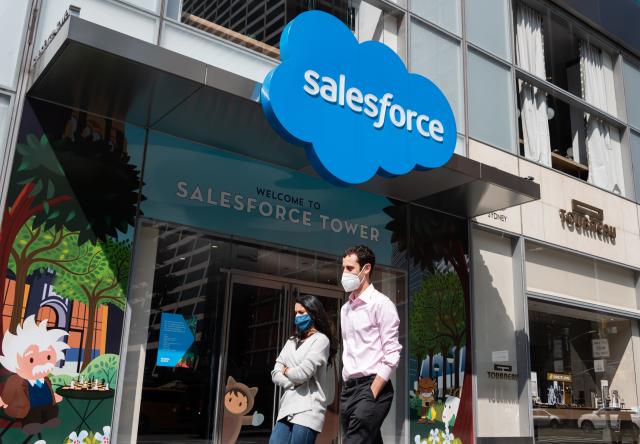McKenzie Gregory was shocked to learn that she had been laid off from her position as an internal communications specialist at Salesforce while she was on maternity leave. She shared her surprise in a post on LinkedIn, revealing that she had assumed her maternity leave would protect her job, as she had just given birth to her son four months prior.
Gregory explained, “I wasn’t heads down or knee deep in some project and the rug got pulled out, but rather I was washing baby bottles while humming a damn Wiggles song stuck in my head (those guys really get ya) when I got the news.”She added in her post, “I was shocked, I thought I was protected being on maternity leave … and obviously I was wrong. You can indeed get laid off on mat leave. Noted.”
According to information on McKenzie Gregory’s LinkedIn profile, she has been employed at Salesforce for over two years. A source familiar with Salesforce informed Insider that employees laid off while on leave will have their leave time-honored, and notice and severance terms would be applied after their leave period, which includes six months of parental leave.
Amidst the recent wave of layoffs affecting various tech companies, there has been a growing concern among pregnant employees or on medical or parental leave about the potential risk of being laid off. It is noteworthy that, despite the widespread misconception, it is not illegal in the US for employers to lay off employees who are on leave or pregnant. Insider has previously reported on this legal loophole, which has raised questions and sparked personal stories among affected employees in the tech industry and beyond.
Companies with a minimum of 50 employees are required to offer at least 12 weeks of unpaid parental or medical off
This reality has brought to light the need for further understanding and awareness about the legal rights and protections for pregnant employees or on leave during layoffs in the US.
According to Gary Martoccio, an employment lawyer representing employees at Spielberger Law Group, being on leave does not provide immunity against being laid off by an employer.
Martoccio claimed, “Most companies will let you finish maternity or medical leave before informing you. But there’s nothing barring a company from laying off someone on leave, assuming that they had a legitimate business reason to do so.”
According to the Family and Medical Leave Act (FMLA), companies with at least 50 employees must offer at least 12 weeks of unpaid parental or medical leave. However, the FMLA does not protect against company-wide layoffs for employees on leave, but it does prohibit employees from being fired solely because they are on leave.
Salesforce aims to reduce the workforce by 10%
In most states across the country, state laws do not expand on the protections provided by the FMLA, and they do not require companies to offer paid leave, according to Martoccio, a licensed attorney in Texas, as told to Insider. If a company chooses to offer paid and more than six weeks of leave, it is at its discretion, as stated by Martoccio.

According to Martoccio, if there is a mass layoff where an entire department or division is let go, including employees on maternity or medical leave, it would not be considered unlawful to terminate those employees. However, if the employee on leave is the only person in their department, position, or division to be laid off, it could be considered unlawful, as explained by Martoccio.
Several stories shared on social media and LinkedIn have echoed Gregory’s experience, including that of a married couple who were both laid off from Google while one was on parental leave.
Gregory was among the employees affected by the recent wave of layoffs at Salesforce, as the company aims to reduce its workforce by 10%, equivalent to approximately 8,000 employees. As previously reported by Insider, the layoffs were first announced in January as part of a restructuring plan to reduce costs. Salesforce CEO Marc Benioff cited over-hiring during the pandemic and the current economic environment as contributing factors in an email to employees.












